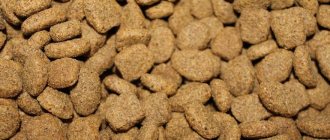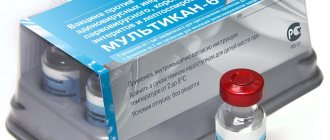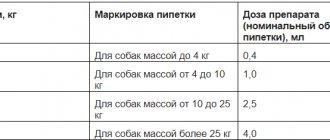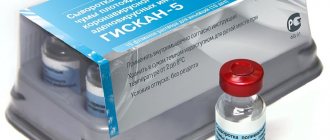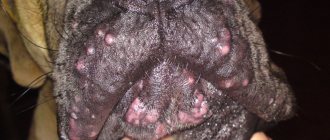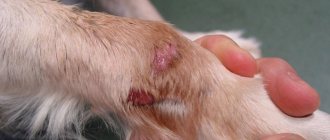It happens that a dog gives birth to many babies and she cannot feed them all on her own, because she simply does not have enough milk or does not have it at all due to the complete inoperability of the glands, as well as due to hormonal disorders or inflammatory processes.
In any case, then you need to resort to artificial feeding of the babies using a bitch's milk substitute. This method is also useful when mom is not around. We will consider all the features of this process in detail in the article.
What should you not feed?
Previously, the process of artificial feeding caused a lot of trouble and often did not bring good results. In order to get at least a little closer to the basic composition of mother's milk, to provide the puppy with the necessary substances for its growth, they mixed cow's eggs with chicken eggs, cream, vitamins and other ingredients. Although purchasing quality products has now become as difficult as choosing the necessary nutrients.
Some people have previously resorted to human infant formulas such as Malyutka and Baby. Although metabolic disorders occurred due to the large amount of sugar in such a diet, concomitant diseases developed in the baby dogs. The puppies also developed problems with the functioning of the gastrointestinal tract. This was evidenced by symptoms such as bloating due to a large amount of accumulated gases in the intestines and diarrhea.
Powdered milk for puppies
Milk replacer, which is used when feeding puppies, comes in the form of a powder that is easily soluble in water. If you choose a good product, newborn dogs can have a digestibility rate of up to 95%.
Now you can buy powdered milk in almost any pet store, as well as online, which will greatly help you prepare for the situation when the bitch cannot feed her puppies on her own. This product will also help if the mother died during childbirth or when she abandoned her children. Then powdered milk is the only solution that will increase the chances of survival of the puppies. It has the properties of a complete and balanced first food. Contains essential protein, vitamins, and elements such as copper, selenium and zinc because they help boost immunity and strengthen the immune system in puppies.
Currently, a wide selection of products of this type is available, differing not only in brand, but, above all, in composition. This is why studying labels is so important. Thanks to this, you can be sure that you have chosen the best product, as close as possible to real breast milk.
Milk substitutes. What must be contained in them?
The most important thing is colostrum. What it is? This is mother's milk, which is released in the first days after birth. It is rich in useful substances. Colostrum is a highly concentrated mixture of beneficial substances such as proteins, vitamins, electrolytes that strengthen the immune system, and more.
Whey protein concentrate should also be included in milk substitutes. It is a source of amino acids, which are indispensable in the development of skin cells, muscles and other body tissues.
The mixture should also contain instant skim milk powder. It contains fat-soluble vitamins, amino acids and minerals.
Another component of the substitute is egg yolk. It is a source of vitamins, proteins, and minerals.
The substitute must contain a substance such as lecithin. It ensures the functioning of brain cells and their development. Lecithin is a rich source of phospholipids, which are important for the proper functioning of cell membranes.
The last required component is cholite (vitamin B4). This substance is necessary for the transmission of nerve impulses. Without it, normal liver function is impossible. Next, we will look at some types of substitutes.
Artificial feeding of a newborn puppy
A newborn puppy drinking milk from its mother provides itself with all the necessary nutrients. This allows him to grow and develop properly. This is why it is important not to wean them off breastfeeding too quickly. In the first three weeks of life, the puppy will only lie down, sleep and suckle to gain strength. Milk contains antibodies that are designed to protect the body from infections and germs.
It is very important that the puppy receives adequate artificial feeding in the first weeks of life in order to gain immunity. But sometimes a mother, for some reason, cannot feed her children. Then the most suitable milk replacer will be, which will not only satisfy the puppies’ hunger, but also provide them with all the necessary substances.
Ready-made milk replacer is a healthy and completely balanced meal. It should be rich in vitamins A, D and E, as well as calcium and phosphorus. Before you decide to select a product from store shelves, carefully read the label on the package and choose the one that has the richest composition.
If you're not sure what diet is right for your puppy, contact your veterinarian ahead of time and they can tell you what to look for.
Remember that puppies should absolutely not be given store-bought cow's milk because their stomachs cannot digest it.
In addition, it contains little protein and fat. Cow's milk contains large amounts of lactose, which can cause diarrhea and vomiting.
Feeding recommendations
We have already found out what kinds of substitutes for bitch's milk there are. Instructions for preparing the mixture are included with each product.
We'll tell you how to feed puppies further.
- If possible, babies should receive breast milk in the first days after birth. This is necessary for modeling the immune system. If this is not possible, then immediately start feeding newborns with a bitch's milk replacer.
- Weigh puppies daily for the first two weeks after birth. After 14 days, this procedure should be carried out every three days until the age of one month. This is necessary in order to correctly calculate the proportions for diluting milk and control weight gain.
- Before you start feeding, be sure to sterilize the nipple and bottle. Warm the milk to body temperature.
- Hold your babies very carefully while feeding. Do not turn them over under any circumstances.
- Before bottle feeding, first squeeze out a drop of formula. Then place the puppy on his tummy and bring the pacifier to his mouth. When eating, the bottle should be at an angle of 45 degrees.
- For the first 14 days after feeding, puppies need to use a damp warm cotton swab to wipe the genital area with massage movements. This must be done so that the intestines work properly, to stimulate it.
Note that a bottle with a nipple is necessary for artificial feeding for up to about two weeks. From the 15th day you can start feeding the puppies from a saucer. If in the first month from birth any problems with the health of the puppies arise (they whine, do not gain weight, diarrhea appears, etc.), immediately contact a veterinarian. Don’t waste time; babies very often die during this period due to health problems.
Massage
After feeding, it is necessary to massage the puppies' tummies to ensure stable bowel function. Up to 3 weeks, babies cannot urinate on their own and empty their bowels.
Active movements help speed up digestion and normal bowel function. You can imitate the movements of a mother dog's tongue using a piece of soft cloth , after dipping it in warm water. Use a clockwise circular motion to massage your puppy's tummy for five minutes before and after feeding.
It is also necessary to massage the baby's butt. Regular hygiene is also mandatory. After the puppy goes to the toilet, use a soft cloth to collect the discharge to prevent skin irritation. The water temperature should not exceed 36 degrees.
Massage for a newborn puppy for bowel movements:
Be sure to monitor the behavior and appearance of your orphans, because their bodies do not yet have enough strength to fight diseases, such as intestinal infections. Even due to such a minor disease, the puppy can die in the first day. When intestinal infections appear, an unpleasant sour smell will appear in the bed, and yellow marks will remain around the butt.
The main cause of infection is usually inflammation of the navel. Bacteria are introduced when a dog with unhealthy teeth chews the umbilical cord. To avoid illness, lubricate the wound on the navel with brilliant green 2 times a day .
Harm
Why is it not recommended to give baby food to dogs?
Firstly, baby food is not as filling as food specially adapted for this purpose.
Secondly, such products are more intended for people, which means they contain components that can easily harm an animal. Do not forget that the gastrointestinal tract of animals and people is different.
Thirdly, such feeding can cause vomiting, diarrhea, and an allergic reaction.
In addition to the above, mixtures can be highly addictive, causing your dog to become picky eaters.
Causes of lactation problems
According to veterinary experts, the following reasons can cause agalactia or insufficient production of milk secretion in an animal:
- The animal has given birth for the first time . Lack of milk in a primiparous female is a fairly common phenomenon associated with the slow production of hormones that stimulate milk production. The stress that dogs experience when encountering unusual sensations in their bodies for the first time also delays the normal production of secretions by the mammary glands.
- Complicated labor . Difficult labor, significant blood loss, and the use of antispasmodics are factors that provoke agalactia and insufficient milk production. The cause of impaired secretion may be a caesarean section performed on the animal.
- The reason for the lack of milk in a new mother is often diseases of the genital organs (endometritis, vaginitis, inflammation or ovarian cyst, etc.). Under the influence of inflammatory and hormonal factors in the dog’s body, the processes of milk production and separation are disrupted.
- Disturbances in the feeding system of a pregnant female. Inadequate diet, low quality feed, lack of vitamin A, E, and ascorbic acid in the diet negatively affect milk production in the female who has given birth.
- Unsatisfactory living conditions for the animal . The lactation process can slow down significantly if the dog is kept in a cold, damp, unheated room.
Veterinary experts note that agalactia or insufficient milk production is often caused by certain medications used to treat a dog during pregnancy.
[custom_ads_shortcode2]
Juices and purees
Here again you need to start from the composition of the product, excluding all possible additives that could harm the animal.
You can give juices and purees to your dog, but not too often and in small quantities so as not to cause an allergic reaction. Most often, this delicacy is mixed into regular food, as a supplement, no more than two to three times a week.
For puppies, 1-2 teaspoons are enough. Complete replacement of natural food with baby food is not allowed; this can lead to diabetes and obesity in the animal.
Attention! There are no exceptions for individual breeds.
How to dilute baby formula for a kitten
Owner's instructions:
- We need to prepare the water. It must be boiled and left to stand. But ideally, it is better to pass boiled water through a filter (a regular pitcher will do). This will rid the liquid of scale particles. You can also use bottled water for children 0 to 3 years old. Before use, it is heated to 37°C.
- After this, pour the dry mixture into the water in a thin stream and mix thoroughly, ensuring that there are no lumps in the resulting “milk”.
- The mixture should be taken 2 times less than indicated in the instructions. For example, if you rely on 50 ml of water to take 10 grams, then for a kitten you need to dilute only 5 grams. All numbers are approximate, you need to read the instructions for the specific mixture!
Benefit
Many owners argue that dogs can be given a variety of infant formulas, justifying this decision with various reasons.
Some give baby formula to puppies, believing that it is ideal for feeding them at a young age. Others are used as dietary food. Some people simply take this food with them on the road as an analogue of normal food.
The reasons and justifications are varied, but is it really possible to give this food to dogs? Because After all, some baby food products are not harmful to dogs, so it’s best to say – not recommended .
Could it get bad?
In fact, a dog can become ill from any food if it has overeaten or tried it for the first time (out of habit).
If you decide to add baby food to your diet, then in the next couple of hours be prepared to put aside everything you are doing to monitor the dog’s condition. The reaction may vary.
Some dogs tolerate new food calmly, even better than they would like: skin problems disappear, the dog becomes more energetic, etc.
But it also happens the other way around. A dog is a predatory creature by nature, so it does not assimilate plant foods well, including the vitamins it contains.
Therefore, if you notice that your pet is feeling unwell (lethargy, nausea), it is best to temporarily remove such supplements from his diet, or eliminate them altogether.
Duration of lactation in dogs
This process usually lasts from six to eight weeks in bitches. Veterinarians do not recommend artificially interrupting such an important period, which is why breeders do not separate puppies from their mother until two months. After eight weeks, the mother independently reduces feeding time and spends less time with her offspring. That is, nature has laid down the process of gradual cessation of lactation as puppies grow older.
It is precisely this gradual weaning of the female offspring from the breast that will never cause stress and digestive problems in babies. Young dogs will grow up becoming familiar with regular foods or foods specially designed for them.
[custom_ads_shortcode3]
Reviews
Looking through different forums and websites, you can see a division into pros and cons. Based on everything we’ve read, we can only say one thing: as many people, so many opinions.
Each type of feeding depends on the animal’s well-being, allergic reactions and contraindications.
One man expressed his opinion like this: “If he eats, then why not?” But is this right? If you look at it, many dogs don’t eat anything, but their health doesn’t get better from it.
The woman said that “You need to feed the dog what you eat yourself - it will be healthier.” It turns out funny, because we also eat food that is far from healthy.
Another argued that “Absolutely not. There are special canned food, porridge and mixtures for puppies and adult dogs.”
In fact, she is right about something. Why experiment with what is intended for a child, if there are specially developed and tested mixtures for our animals? Yes, the price may be steep, but you don’t have to worry so much about your health.


